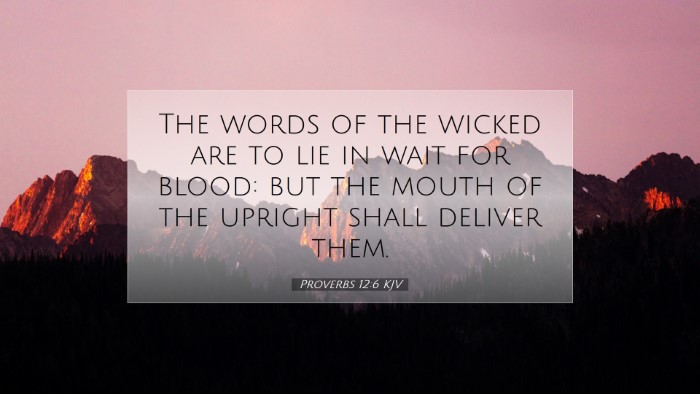Commentary on Proverbs 12:6
Verse: "The words of the wicked are to lie in wait for blood: but the mouth of the upright shall deliver them." (Proverbs 12:6, KJV)
Introduction
The Book of Proverbs is a treasure trove of wisdom, providing guidance on living a righteous life in accordance with God's principles. This particular verse, Proverbs 12:6, highlights a stark contrast between the speech of the wicked and that of the upright. The insights gathered from public domain commentaries provide a deeper understanding of this scripture, revealing not just the dangers posed by wickedness, but also the restorative power of righteous speech.
Analysis of Key Terms
- Wicked: Refers to those who engage in morally corrupt practices and schemes that are harmful to others.
- Words: The emphasis on speech highlights the power of language in shaping actions and intentions.
- Upright: Signifies those who are morally right, just, and adhere to God's commandments.
- Deliver: Indicates rescue or liberation from danger or distress, emphasizing the protective quality of righteous communication.
Commentator Insights
Matthew Henry
Henry draws attention to the malicious intent behind the words of the wicked, portraying them as premeditated traps set for the innocent. He notes that such words are aimed at inciting violence or harm, reflecting a deep-rooted hatred. In contrast, he emphasizes the redemptive aspect of the utterances from the upright, suggesting that their words serve as a means of edification and salvation for others. The implications of this contrast serve as a moral guideline for the reader—how one's speech can influence the moral fabric of society.
Albert Barnes
Barnes expands on the idea of words as instruments that either harm or heal. He posits that the words of the wicked are like snares, entangling those who are unsuspecting. This imagery presents the reader with a vivid understanding of how dangerous and deceitful communication can lead to real suffering. On the other hand, Barnes underscores that the mouth of the upright serves as a source of wisdom and truth, capable of delivering individuals from peril, both spiritually and physically. His commentary highlights the necessity of aligning one's speech with God's righteousness in order to foster a safe and supportive community.
Adam Clarke
Clarke provides a historical context to the verse, linking the nature of wicked speech to ancient practices of betrayal and violence. He comments on how the wicked often resort to deceitful speech to achieve their sinister goals, thereby exhibiting traits of treachery. In contrast, he points out the encouraging role of the upright's words in counteracting such wickedness. The upright’s speech not only defends the innocent but can also convert the wicked through its truth and clarity. Clarke’s observations reinforce the idea that words have the power to transform lives and alter the course of one's destiny.
Theological Implications
This verse serves as a profound reminder of the ethical implications surrounding speech within the theological framework. It challenges the readers, especially pastors and scholars, to consider the weight of their words—whether for good or ill. The dichotomy presented invites reflection on how one's communication reflects their inner moral alignment and ultimately influences others’ lives.
- Ministry Application: Pastors can utilize this verse to teach congregants about the importance of wise speech in their interactions both within the church community and in the world.
- Personal Reflection: Each individual is called to examine their own speech patterns and consider whether their words align more closely with the wicked or the upright.
- Community Building: The verse encourages the creation of a supportive environment where honesty and righteousness prevail, enabling growth and protection from moral dangers.
Conclusion
Proverbs 12:6 serves as both a warning and a beacon of hope. The commentary derived from Henry, Barnes, and Clarke offers profound insights into the nature of our words and their potential consequences. The call to speak righteously is clear; it is a call not only to safeguard oneself and others but to actively engage in the work of deliverance through our speech. Pastors, students, theologians, and scholars alike are encouraged to embrace this wisdom as they navigate their personal and communal lives in accordance with the divine calling for righteousness.


